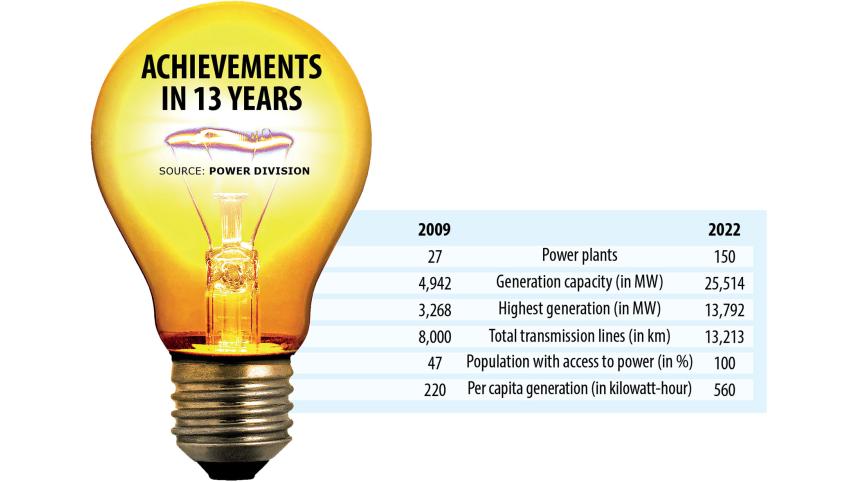We are entirely under electricity coverage!

That the government has brought 100 percent of the country's population under electricity coverage is truly an amazing achievement. Data from the Power Division shows that our installed power generation capacity rocketed to 25,514MW from 4,942MW in 2009, while the maximum power production rose to 13,792MW, from 3,268MW 13 years ago. According to the World Bank, in South Asia, Bangladesh is now ahead of India and Pakistan, who have brought 98 percent and 74 percent of their population under electricity coverage, respectively.
Back in 2009, reportedly only 47 percent of Bangladesh's population had access to power. The government deserves praise for bringing the rest of the population—more than half—under the electricity network in just 13 years. According to the state minister for power, energy and mineral resources, the government has taken electricity transmission lines to even the remotest areas of the country. This means that all the relevant agencies have worked efficiently to achieve this feat.
While we commend the government for achieving this milestone, we would also like to remind them of the challenges that lie ahead—that it must make electricity affordable to all citizens of the country, and the supply should also be uninterrupted. It is true that electricity has been taken to the people in the remotest of areas, but can the people living in those areas afford it? According to a BIDS study, 10-15 percent of the population could not access electricity in many areas despite having electricity coverage, due to the rising costs. Transmission and distribution systems across the country must also be upgraded to minimise system loss and ensure smooth supply.
Bangladesh currently has an overproduction of electricity, with more than 40 percent excess power generation capacity. In fact, the government is paying Tk 5,000 crore every year to private rental and quick rental power plants as capacity charges for the surplus electricity, according to the Bangladesh Power Development Board, which means that over the last 10 years, Tk 50,000 crore of taxpayers' money has been wasted. Moreover, we still rely on expensive fuels for power generation, which increases the production cost. This eventually burdens the consumers with increased prices.
Most importantly, the government must consider moving to renewable energy to cut reliance on fossil-fuel-based power generation in the coming days, which is unsustainable from both environmental and economic perspectives. While the world is moving away from coal-fired power plants, Bangladesh ranked sixth globally for the amount of coal usage in 2019, according to Global Energy Monitor. So, achieving 100 percent electricity coverage will only be meaningful if the issues mentioned above are properly addressed.



 For all latest news, follow The Daily Star's Google News channel.
For all latest news, follow The Daily Star's Google News channel.
Comments